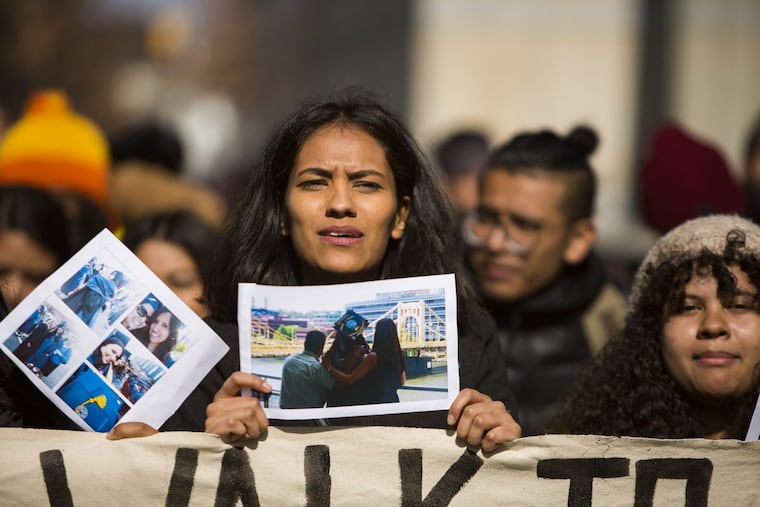DACA activists stop at the Liberty Bell on an N.Y.-to-D.C. march
DACA recipients say they don't want a deal that benefits them at the expense of others.

It's a step-by-step, 250-mile walk by DACA recipients to demand a legislative answer, a long, purposeful ramble by 11 immigrant youths who started out in New York, plan to finish in Washington, and stopped Tuesday to rest and rally at the Liberty Bell.
Philadelphia marked the halfway point of the Walk to Stay Home: A Journey of Hope, a punishing, 15-day trek set to conclude as protection from deportation expires for about 690,000 young, undocumented immigrants known as "Dreamers."
The walkers came into Philadelphia, several said, with blistered feet, worn shoes, and strong hearts. It was important to walk — not to bike, or caravan by car — to honor those who walked from one country to another to build a new life, and those who were jailed or deported in the effort, they said.
"I'm not walking alone," said Cata Santiago, 20, of Florida. "I'm walking with community and support."
They want, they said, what's referred to as a clean Dream Act, a reference to legislation that would provide immigrant youth and young adults with a way to become legal residents — and which never passed Congress after first being introduced in 2001.
Instead, the Obama administration established Deferred Action for Childhood Arrivals by executive action in 2012. DACA allowed young people — those brought here illegally as children — to live, work, and attend school in the United States.
But groups like the conservative Heritage Foundation have railed against the program as an unconstitutional, presidential overreach, and President Trump ended DACA on Sept. 5.
Trump delayed implementing his decision for six months to give Congress time to act, effectively creating a March 5 deadline. With less than two weeks to go, a solution is nowhere in sight.
The pressure showed Tuesday in the tired eyes and drawn faces of a group that has walked along interstate highways and bike lanes, across city streets and dirt pathways. They have slept in churches, and eaten what friends along the way had to offer.
The number of walkers was significant —11, one for each of the 11 million undocumented people living in the United States. Several carried photos of family members from whom they have been separated, or who sacrificed to make their own lives possible.
Trump has proposed to offer a path to citizenship not just for DACA enrollees but for an estimated 1.8 million undocumented immigrants who meet its requirements. In exchange, he wants $25 billion to build a wall at the Mexican border, and drastic reductions in forms of legal immigration.
Democrats have balked. And DACA recipients say they don't want a deal that benefits them at the expense of others.
On Tuesday, the walkers moved south down Sixth Street, turned east on Market Street, then south through Independence Mall to the Liberty Bell — greeted by cheers and applause from about 20 supporters.
"I went down to the Capitol, and I took back what they stole from me," they sang, "and I took back my dignity, and I took back my humanity."
A William Penn impersonator strolled by. Tourists with cameras slung around their necks paused to investigate the fuss. Several people broke out their cellphones to record the speeches.
"Daddy," cried out Haydi Torres, 20, an undocumented youth who attends the University of Rochester, "I will fight for you, I will give my life to you, because for 15 years I didn't have you."
All that time, she said, she knew her father only as a voice on the phone. He was in the United States, living legally under Temporary Protected Status, which grants haven to foreign nationals if a return to their homeland would put them at risk of violence, disease, or death. The TPS for Honduras is set to expire in July.
Torres, who came to the United States from Honduras in 2013, said she has no fear of speaking out, despite being undocumented. In a couple of weeks, she noted, the protection afforded to DACA recipients will slip away, putting them as much in danger of deportation as anyone else.
She and others spoke one by one, holding photographs of mothers and fathers, aunts and grandmothers. All were tired, several tearful. They said they want legislation that grants permanent protection for undocumented youth but that doesn't harm the 11 million undocumented people living in the United States.
"I was getting something that would protect me," said Ricardo Cruz, 32, a naturalized citizen who lives in Florida, "but my family wasn't protected."
The Walk to Stay Home was organized by the Seed Project and supported by the #OurDream Campaign. It departed New York on Feb. 15, picking up allies who are to join in a final demonstration at the Martin Luther King Jr. Memorial in Washington.
"I'm not thinking about the pain," said Karla Rojas, 23, of Philadelphia, a DACA recipient from Mexico who was nursing a sore knee. "I think it's bringing attention to the public."